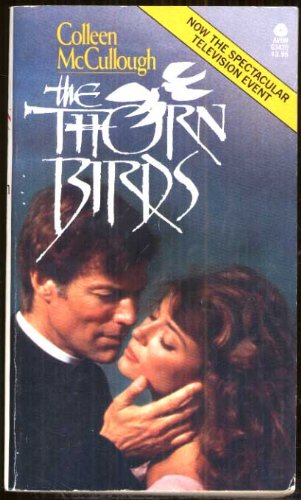Due to a lot of outside factors, September (and October, thus far) was not a good month for me, reading-wise. For the first time this year on Goodreads, I am not any books ahead of where I should be (down from seven books ahead a few months ago). Granted, part of this is due to the fact that I spent most of September reading a very long book -- Shogun, which beat out The Pillars of the Earth for longest book thus far this year -- an unfortunate general malaise about reading, and an inability to pick a "next book" to read.
On Monday, I decided to check out my shelves and see what (thus far this year) I haven't read. Only one book stood out. And now, a hundred or so pages into it, I'm realizing that it was exactly what I needed right now.
To say that this book is one of the ones that has influenced my life the most is probably an understatement. Colleen McCullough published her epic saga about a Catholic priest and his illicit love for a young woman in New South Wales, Australia, in 1978, five years before I was born. In 1983, the miniseries starring Richard Chamberlain and Rachel Ward was released, and the name Meghann and its variants skyrocketed to number 8 on the list of most popular names for that year. I was one of the many thousands of "Megans" born in 1983. And I wasn't prepared for the embarrassing essay I had to write for my Confirmation class, fourteen years later, about how my parents chose my name. "I was named for the heroine of a novel who falls in love with a Catholic priest." Awkward.
And yet, when I picked up the book, I had no idea how much I would fall in love with it, the story of a forbidden love, of two people who rush headlong into their passion, neither knowing or caring about the destruction they bring about on themselves and their future. To me, The Thorn Birds is more a more passionate and terrible romantic tragedy than Romeo and Juliet. In the latter, the lovers are children who have no idea what they are doing to themselves, no scope of the world beyond each other. In the former, they surrender willingly to the fate that will inevitably destroy them. And why? Because they know that they are worth it.
The prelude to this incredible book is beautifully-written, and expresses a lot of the way I've been feeling these past few weeks. Although I have read The Thorn Birds many, many times in the past thirteen years, re-reading it this time has been like a conversation with an old friend, when she reveals things to you that you never knew about her before. I'm enjoying it more than I ever imagined I would, even after all these years.
There is a legend about a bird which sings just once in its life, more sweetly than any other creature on the face of the earth. From the moment it leaves the nest, it searches for a thorn tree, and does not rest until it has found one. Then singing among the savage branches, it impales itself upon the longest, sharpest spine. And, dying, it rises above its own agony to out-carol the lark and the nightingale. One superlative song, existence the price.
But the whole world stills to listen, and God in His heaven smiles. For the best is only bought at the cost of great pain...or so says the legend.




